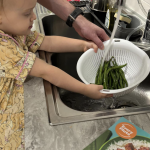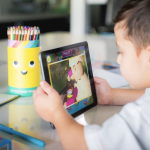Why You Should Think Twice Before Fighting In Front of Your Kids

Why You Should Think Twice Before Fighting In Front of Your Kids
I am not happy to admit this but I have been guilty of completely losing my shit with my partner in front of my kids. When they were probably about 8 and 9 my husband had asked me to make Chop Suey “just like his mum made”. I looked up the recipe on-line and followed it exactly, tasted it, liked it and was pretty chuffed with myself that after having been at work all day, I had one of his favorite dishes ready when he walked in the door. He took one bite, declared it too salty and pushed his plate away. Exasperated and pissed off, I picked up my plate and stomped off to the other room to eat it on my own because I knew if I stayed in the kitchen, I was going to explode. Unfortunately, my husband followed me into the other room, told me that I was acting like a baby and that it wasn’t my fault that I didn’t know how to make it like his mum. I took my plate and threw it like a frisbee against the wall. Not only did I take a chunk out of the plaster, I had to spend the next 20 minutes embarrassingly cleaning up the mess I’d made. The kids heard it all and God knows what they thought.
It wasn’t the only time I lost control but fortunately me losing my shit wasn’t a regular thing and the kids also saw that 90% of the time we held hands, we cuddled, we kissed, we told each other we loved one another and spent more time laughing together than yelling.
In the past year I have born witness to two different relationships that have really been bothering me. Both couples have two children and both of these couples are at odds; in different ways mind you but the problem is that the kids are seeing and hearing everything because they’re doing it in front of their children.
Mates of ours that I will call Steve and Louise are splitting up. Couples splitting up are nothing new and when couples split up, emotions run high and things are probably pretty scary in the house just because they’re splitting up and the kids don’t know in what ways their lives are going to change. That’s bad enough. But these kids have been listening to their mother call their father ALL the words. Even the C word. They have watched their mother scratch his face, throw things at him and punch him in the stomach. They listen to her scream at him in person and over the phone, sometimes multiple times a day and have stood by and listened while their mother lists all of his wrong-doings to acquaintances they bump into in the supermarket.
Another couple we know that I will call Carl and Lisa are also at odds with each other. They’ve kind of always been at odds with each other and maybe they enjoy the drama or, because they are a couple who shouldn’t be a couple but are staying with each other for the sake of the kids. Who knows but every time we have them for dinner (and the invitations are becoming increasingly more scarce), there is massive tension between them and words like bitch and asshole are dropped in sentences to their kids about each other. As in, “pass the bread to the bitch”. Or, when they found our nerf gun stash the other day, “fire them all at your stupid asshole father’s head”. Which reminded me of that ad on TV where the father encourages his son to kick the football at his mother’s head and then laughs when it hits her.
Both of these situations are causing irreparable harm to these kids. In their book Marital Conflict and Children; An Emotional Security Perspective, Cummings and Patrick Davies write:
“When parents are abusive to each other in front of their children, long term effects can include children becoming distraught, worried, anxious and hopeless. They can react outwardly with anger, becoming aggressive and developing behaviour problems at home and at school or can lead to sleep disturbances and health problems like headaches and stomach aches. Their stress can interfere with their ability to pay attention and create learning and academic problems at school. Children raised in environments of destructive conflict have problems forming healthy, balanced relationships with their peers.
Carl and Lisa’s son David was picked by multiple children last year in an anonymous poll when asked to name bullies in their school.
Kids don’t get used to it.”
Researchers Rena Repetti, Shelley Taylor and Teresa Seeman at UCLA found that those who grew up in homes with high levels of conflict had more physical health problems, emotional problems and social problems later in life compared to control groups. As adults, they were more likely to report vascular and immune problems, depression and emotional reactivity, substance dependency, loneliness and problems with intimacy.
And it’s important for kids to learn that parents can have conflicts and resolve them happily because they are going to be faced with conflicts in their lives and need to know that not everything is roses and chocolates so even though I look back on my moments when I lost control and cringe, it probably didn’t do them any long term harm.
Some types of conflict are not disturbing to kids, and kids actually benefit from it. When parents have mild to moderate conflict that involves support and compromise and positive emotions, children develop better social skills and self-esteem, enjoy increased emotional security, develop better social skills and self-esteem, enjoy increased emotional security, develop better relationships with parents, do better in school and have fewer psychological problems.
“When kids witness a fight and see the parents resolving it, they’re actually happier than they were before they saw it,” says Cummings. “It reassures kids that parents can work things through. We know this by the feelings they show, what they say, and their behavior—they run off and play. Constructive conflict is associated with better outcomes over time.”
Tips for Resolving Conflict
Glucoft Wong shares her top five tips to help parents resolve conflict, maintain a loving relationship, and role-model effective problem-solving for children:
- Lead with empathy: Open the dialog by first letting the other person know that you see them, you get them, and you can put yourself in their shoes. Example: “I know it must be hard to leave work….”
- Give your partner the benefit of the doubt. Assume the best intentions and help yourself remember that you love each other by adding an endearment. Example: “I know you didn’t mean to team up with the kids against me, Sweetheart….”
- Remember that you’re on the same team. Deal with issues by laying all the cards on the table and looking at them together to solve a dilemma rather than digging in on opposing sides. Then problem-solve with one another. That way you both “own” the solution.
- Constructive criticism only works when your partner can do something about what happened. If the deadline for soccer signup was already missed, remedy the current situation as best as possible and talk about how to do it better next time. Blaming won’t fix anything that’s already happened.
- Anything that needs to be said can be said with kindness. Disapproval, disappointment, exasperation—all can be handled better with kindness.
Little eyes are watching, and little ears are listening.













